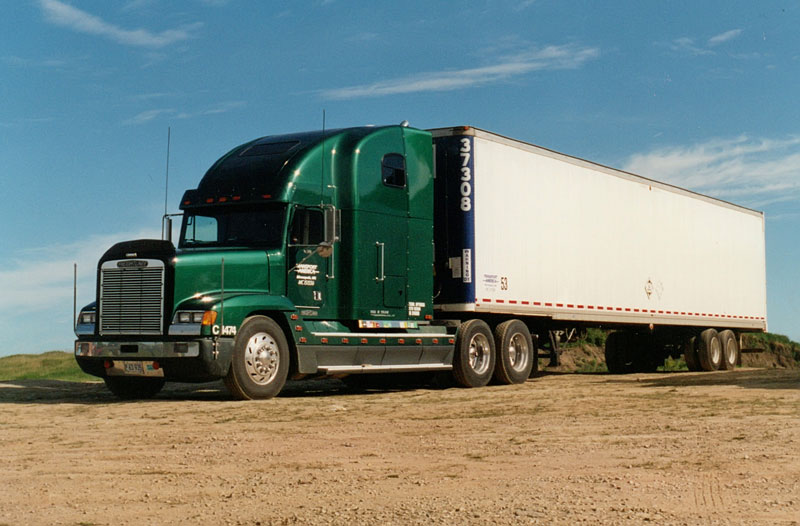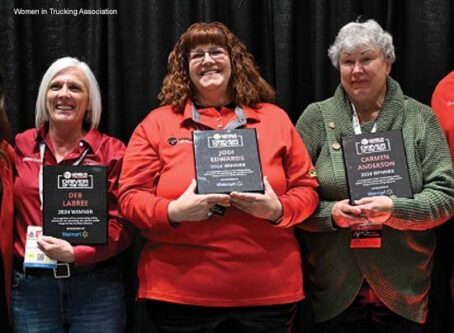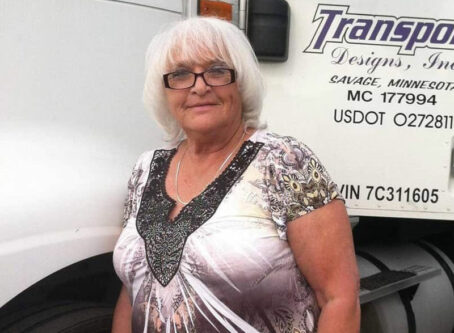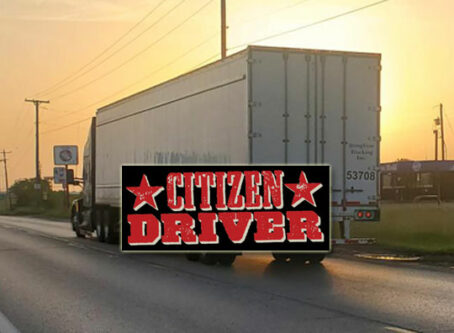Remembering a 1994 road trip with an owner-operator
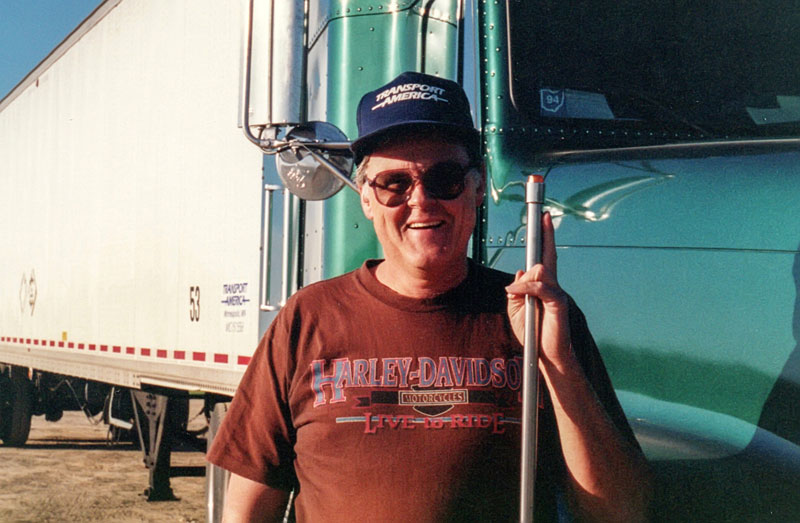
Recently I found notes from a ride-along with a truckload driver Richard Hitchcock 25 years ago. It was interesting to see what has changed in a quarter of a century. It was just as interesting to see what hasn’t changed at all.
In June 1994, I hitched a ride with Richard, a 54-year-old owner-operator leased to Transport America of Minneapolis.
Usually Richard and his wife, Christine, drove as a team. She stayed home for this trip. I came aboard at half-past midnight at the Bendix Diner on Route 17 in Hasbrouck Heights, N.J. For the next five days Richard and I rode to Newark, N.J.; Milton, Pa.; Youngstown, Ohio; Kenosha, Wis.; Louisville, Ky.; Gainesville, Ga.; Crossville, Tenn.; Fort Chiswell, Va.; and finally to Wallkill, N.Y., where Richard parked his two Harleys and where he and Christine lived.
The trucking landscape
Richard and I had a contest as we rolled in his 1994 FLD Freightliner: Who could name the most carriers that had gone out of business in the 14 years since deregulation in 1980? As dedicated truck watchers, we named hundreds. Most were union less-than-a-truckload companies. It was a hard-fought struggle. Richard finally won.
In a truck stop conversation, one driver said it was hard to believe that McLean Trucking, once the fifth largest carrier in North America, was gone. In fact, McLean Trucking had gone out of business eight years earlier, in 1986. We spotted Carolina Freight trailers at the J.C. Penney warehouse in Wauwatosa, Wis. At another stop we met a Carolina driver. He worried about the future, and rightly so. Carolina would cease to exist one year and one month later in July 1995.
In 1994, only a few old-time, union LTLs still rolled. They were being pushed off the road largely by the growing truckload sector. Of the loads we hauled over five days, none used even one quarter of Richard’s 53-foot trailer. One was less than 2,000 pounds. That kind of shipment was once profitable LTL freight. In 1994, a truckload carrier could eliminate LTL handling and relays, taking a shipment door-to-door in less time for less money.
One of those big truckload carriers with more than 4,500 trucks in 1994 was MS Carrier. Their equipment seemed to be everywhere. We chatted on the CB with a MS Carrier driver on our way to Fort Chiswell. He was a newbie just four weeks on the job. Based in Memphis, Tenn., MS Carrier was the 25th largest carrier when it merged with Swift in 2001 and all but disappeared. Swift was then the 19th largest. Known as Knight-Swift since 2017, the company is now the fifth largest carrier after UPS, Fedex, XPO, and J.B. Hunt.
Richard’s carrier, Transport America, was going public in 1994. It had launched in 1984 and in 1994 had about 500 company trucks. Richard was one of 150 owner-operators. At its peak, Transport America ran more than 2,000 power units. It is now a subsidiary of Canadian transportation giant TFI International, which is ranked the 10th largest carrier in North America.
Communications
Richard had a Qualcomm satellite unit mounted in his cab. Qualcomm had been introduced only five years earlier. Transport America was an early adopter. Many drivers – many of whom had yet to use one – disliked the device that told dispatch where they were. Not Richard.
“You don’t have to stop and find a phone. I love that,” he said.
Qualcomm is now Omnitracs, and most trucking communications go through cell towers, not satellites. It’s hard to find a pay phone at all.
The Truckin’ Bozo
The Truckin’ Bozo was long-time radio personality Dale Sommers who broadcast country music and talk nights from Cincinnati over WLW Clear Channel. At different times over five days, Richard tuned in. One night as we crossed Ohio in the moonless, starless dark, Dale warned his many listeners across the country that the United Nations had 600,000 troops in the U.S. I was amazed to learn the U.N. was going to impose a world income tax and that black U.N. helicopters had been spotted over Ohio and other places around the country. Dale, a good friend of truckers, was profiled by Land Line. He moved to Sirius XM Satellite Radio in 2004, where he stayed until his death in 2012.
Driver ‘shortage’
At one point on The Truckin’ Bozo, Dale reported that 12 men from the Caribbean island of Grenada were being trained as drivers in Fort Wayne, Ind. Maybe it was true, maybe not. There were rumors at the time of U.S. carriers recruiting drivers or trainees from other countries. One fantastic rumor said MS Carrier had imported 200 Englishmen. In fact, the American Trucking Associations was then lobbying Congress to let carriers bypass immigration rules so they could do just that. The idea was to import English speakers from the Caribbean among other places. Even had Congress gone along, it would not have had any discernible impact on driver turnover. Neither would their current scheme to recruit drivers as young as 18.
We heard driver recruitment ads on the radio and even saw them on mud flaps. A billboard on I-75 in Tennessee screamed “top drivers earn $95,000!” Of course, you couldn’t get that job then any more than you can get it now. Big carriers and the ATA were up to the same nonsense then as they are now. They never give up.
Parking
It’s worse now than it was then, but it was bad then too. Sunday night, we were frozen out of the Flying J where Richard had hoped to find a space.
“We should have been here an hour ago,” he said. On the road, Richard pointed out new restaurants that didn’t provide truck parking and at least one long stretch of New Jersey highway with nowhere to even stop all the way to the New York state line. “The truck stops and rest areas are full at night. You can’t drive over hours, but you can’t stop either,” he said.
Flying J was still Flying J then. In 2009, in the depths of the Great Recession, Pilot purchased the company and the two became Pilot Flying J.
Some things change
Richard kept a paper log. There were no ELDs – none to speak of anyway. Tech companies like Peoplenet and Qualcomm were working on them, and so was carrier Werner Enterprises. In 1994, the Bureau of Motor Carrier Safety allowed Werner to develop its own automated logging system. The Werner system would be installed across its fleet four years later in 1998 – the first deployment of automated logs in a commercial carrier.
In 2000, the Bureau of Motor Carrier Safety graduated from a mere bureau within the Federal Highway Administration to a full-fledged administration within the U.S. Department of Transportation – the Federal Motor Carrier Safety Administration.
Our trip from Youngstown, Ohio, to Wauwatosa, Wis., was 477 miles at 84 cents a mile. In Gainesville, Ga., Richard took on 126 gallons of fuel at 96 cents a gallon. The Econo Lodge in Gainesville cost $34. That place charges roughly $70 now. Richard had his Freightliner tractor washed at a Blue Diamond in Knoxville, Tenn., for $32 – about half what it costs now.
What has changed the most in 25 years?
“I said it’s all the rules and regulations,” Richard said recently. “One of the worst I believe is the 14-hour rule that made everybody drive faster. You have to get everything done in that 14-hour clock.”
Some things stay the same
Driver turnover is pretty much the same now as it was then. Because the country and the economy have grown, the actual number of drivers passing through the Great Truckload Driver Eating Machine has grown, but the rate of turnover was high then – 80-90%. It’s still high.
Good jobs had all but disappeared, especially in New York state. Then, as now, trucking offered the chance to earn a living wage. But pay was only part of the picture. The real cost of trucking has not changed. That cost then as now included a serious toll on drivers’ families. Richard told me Christine is his third wife.
“Trucking definitely had something to do with that,” he told me then.
But Richard and Christine have been together since 1981. For 20 years, they drove as a team. Today, they live in Duncan, S.C., where Richard, now 79, keeps his hand in the business by repositioning equipment for Penske between rental locations.
Richard Hitchcock is an OOIDA life member.
